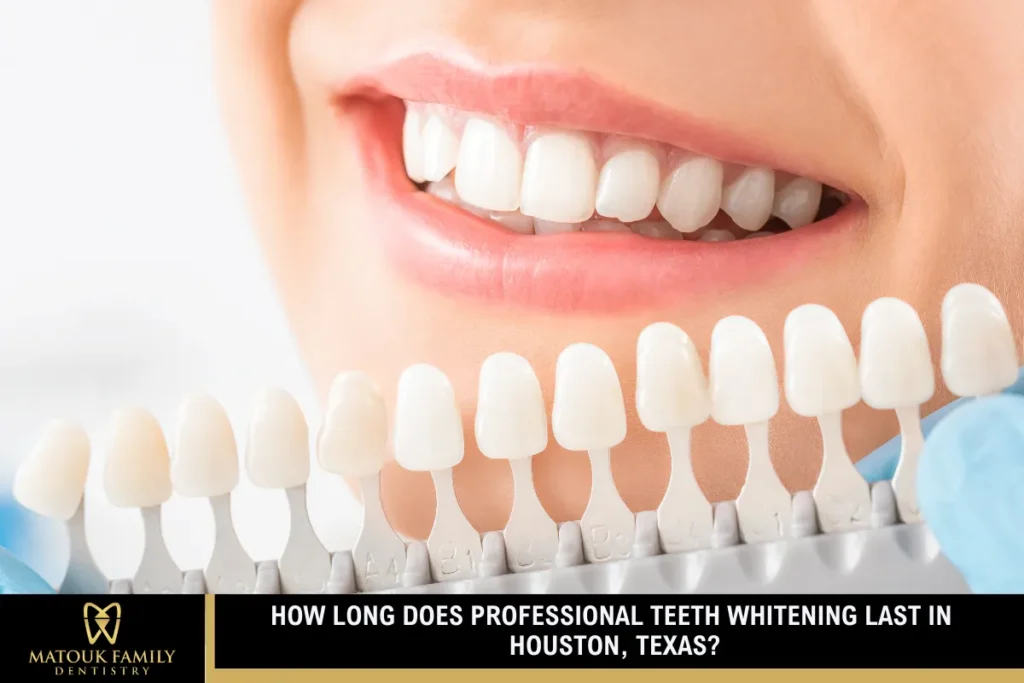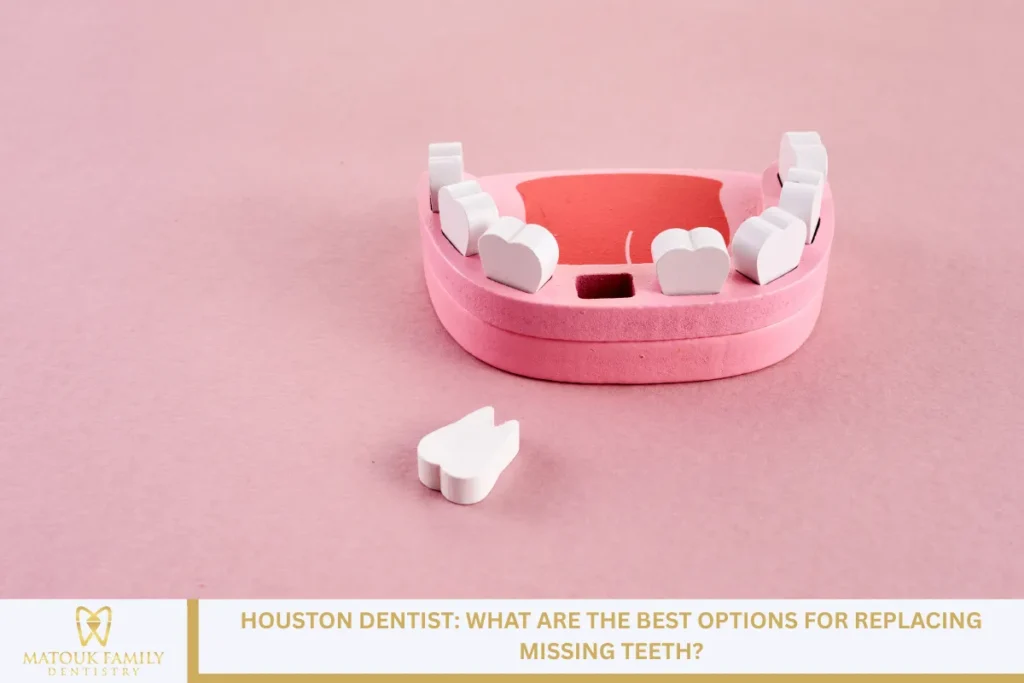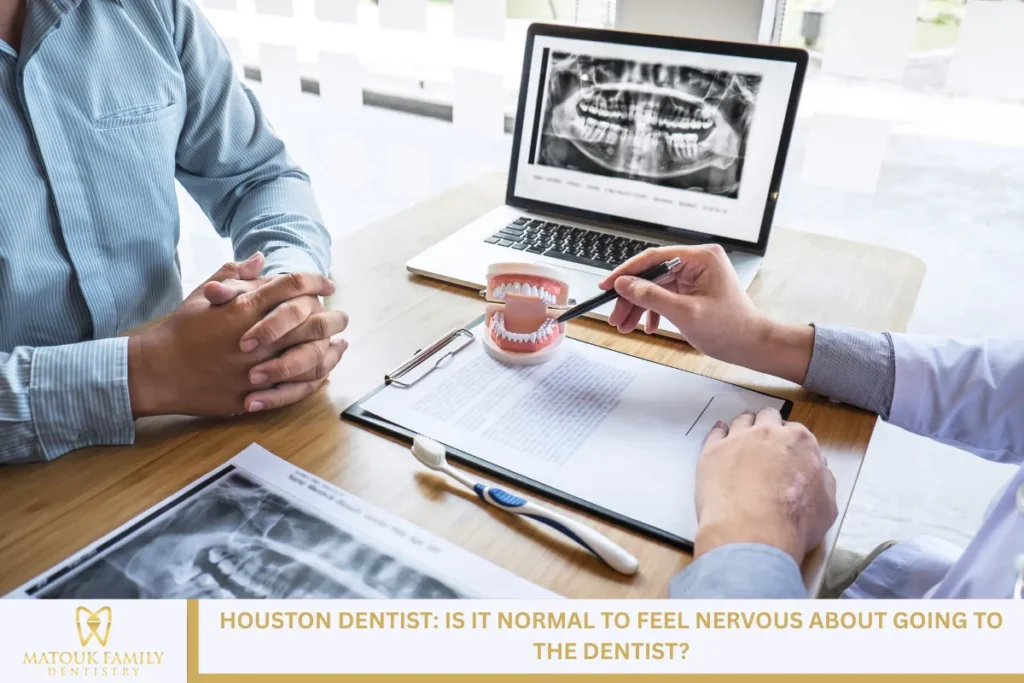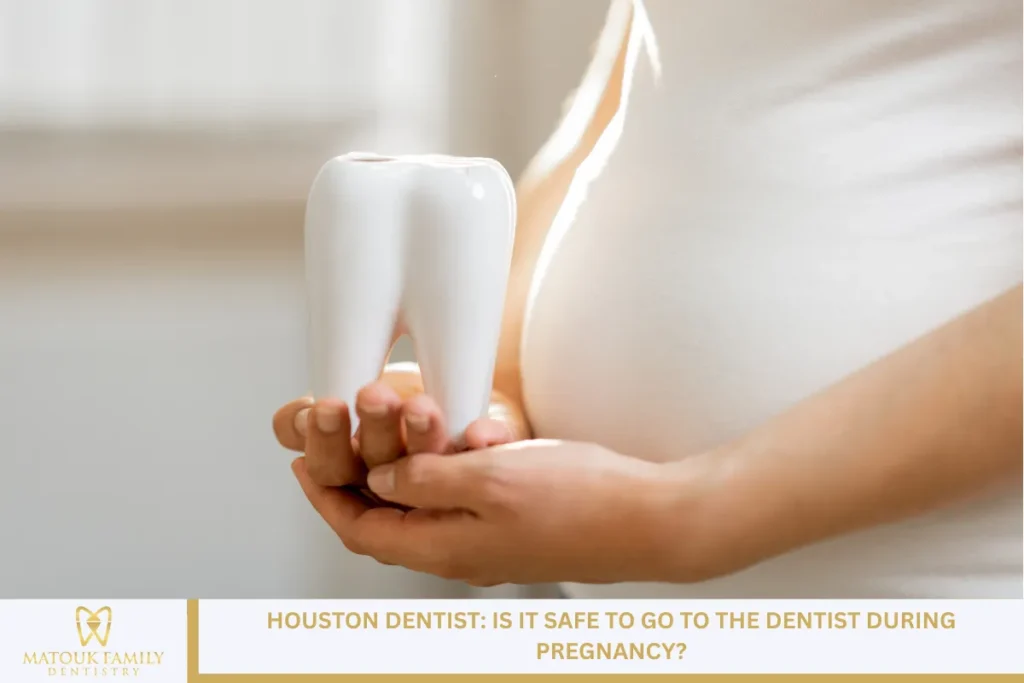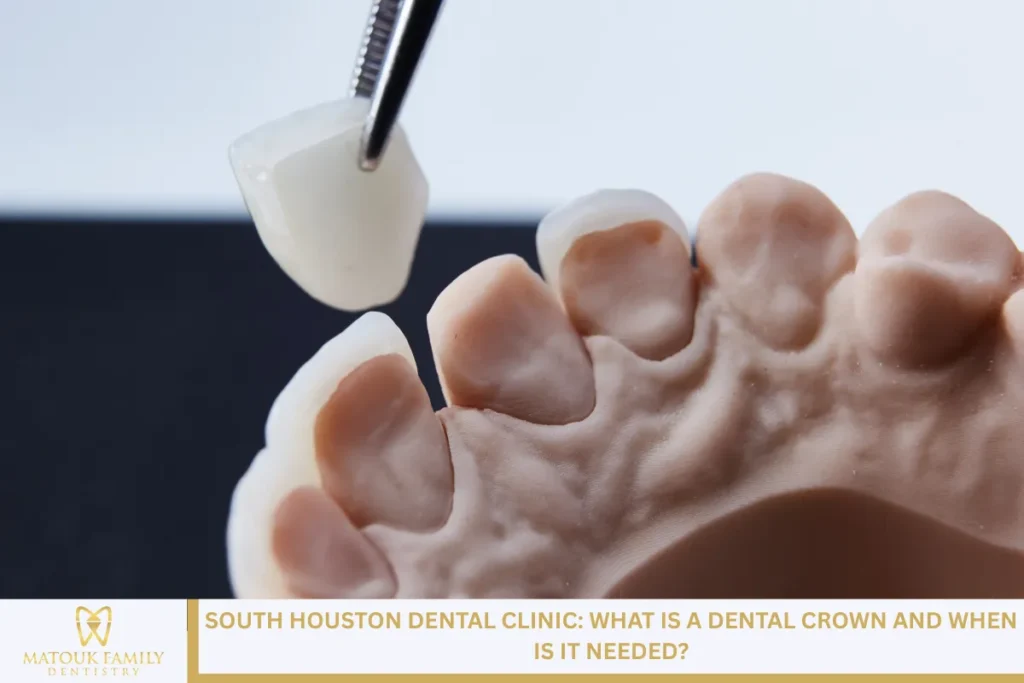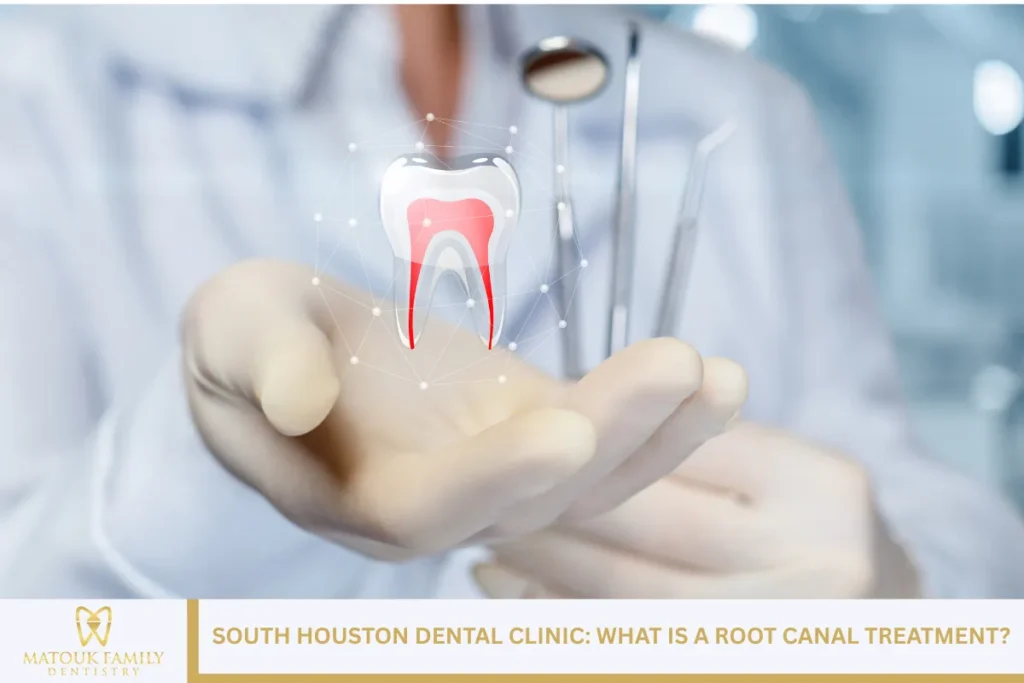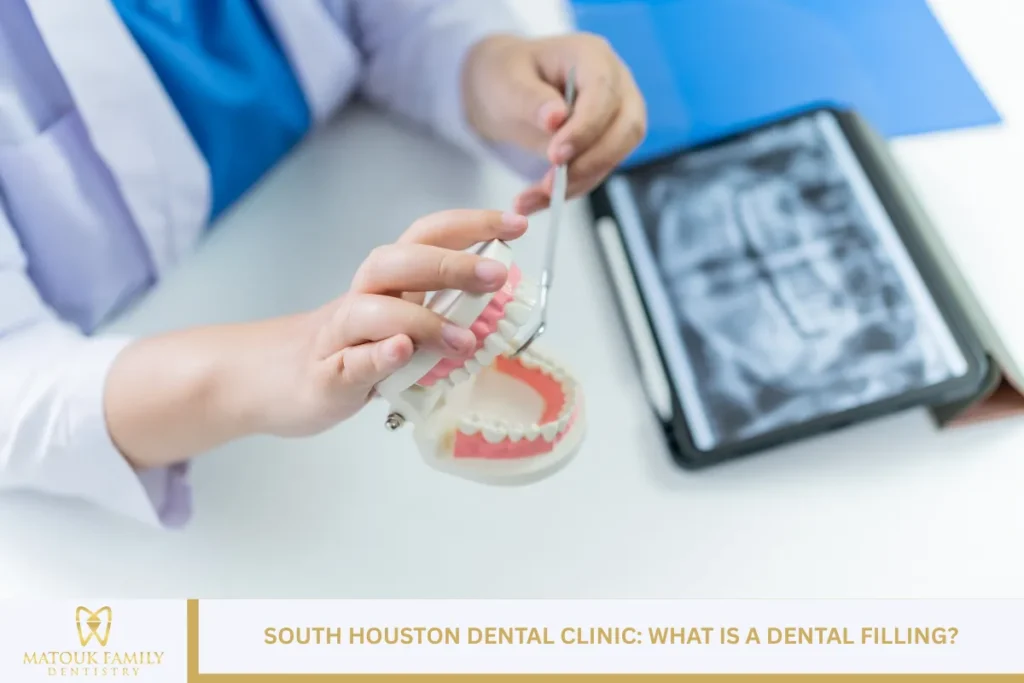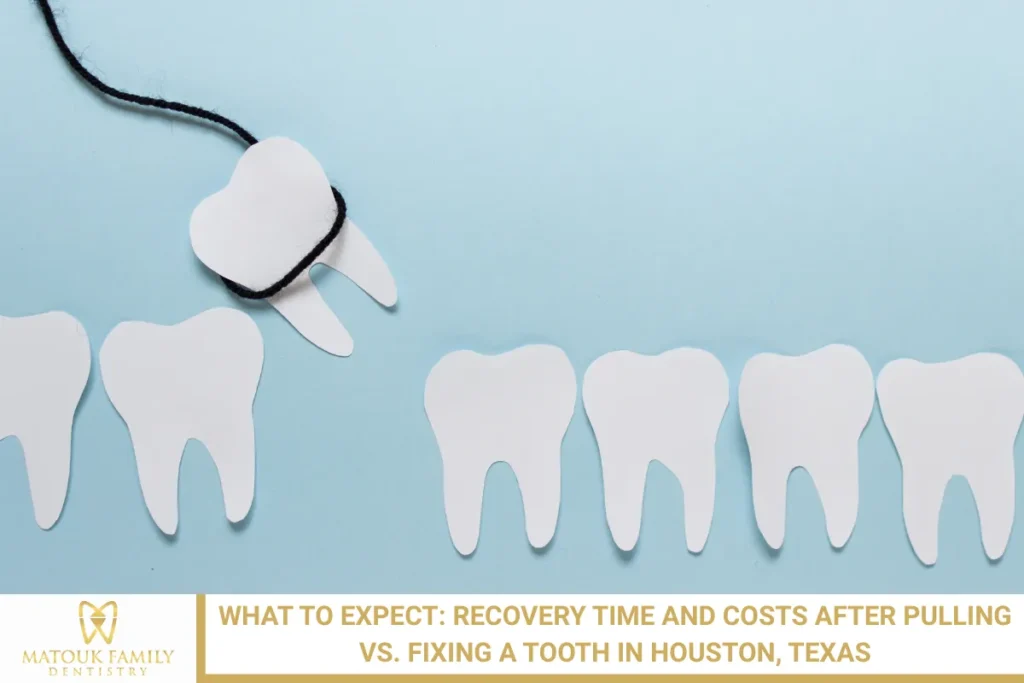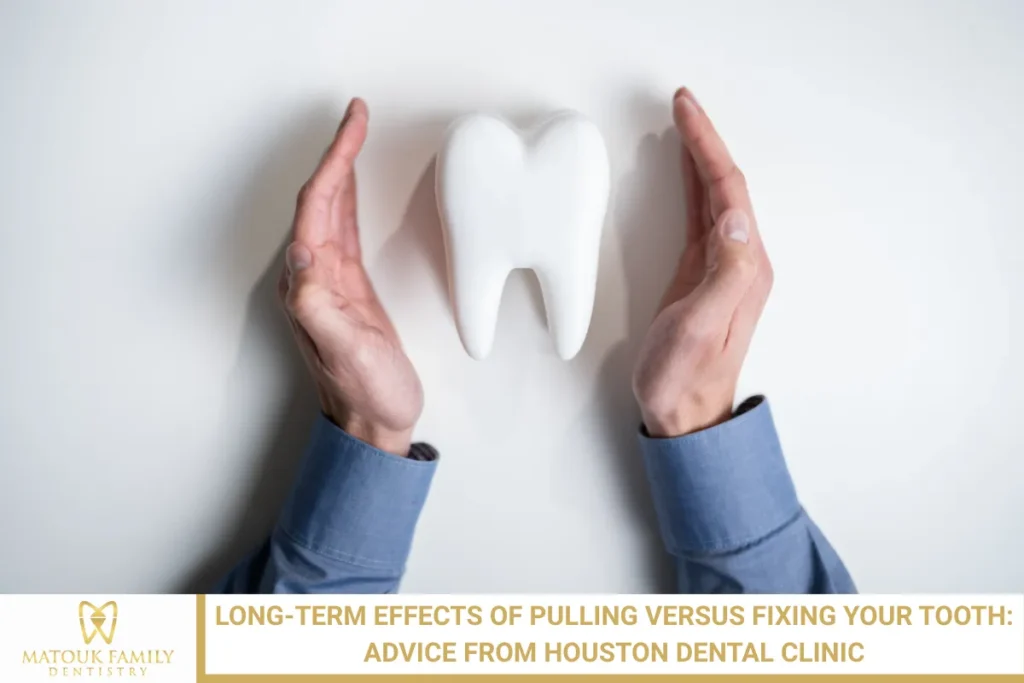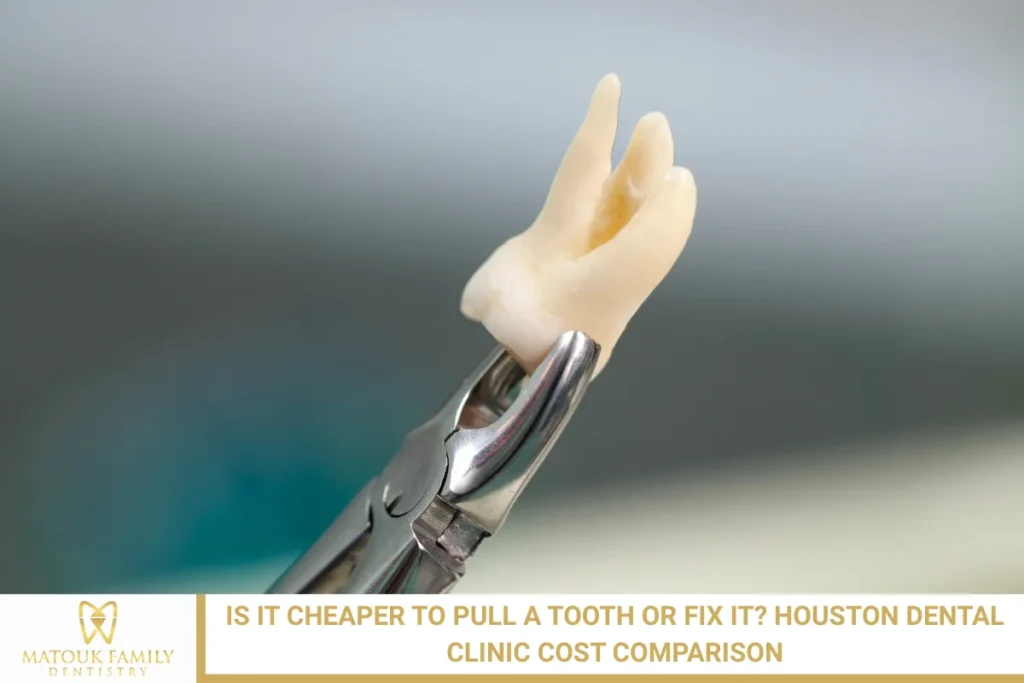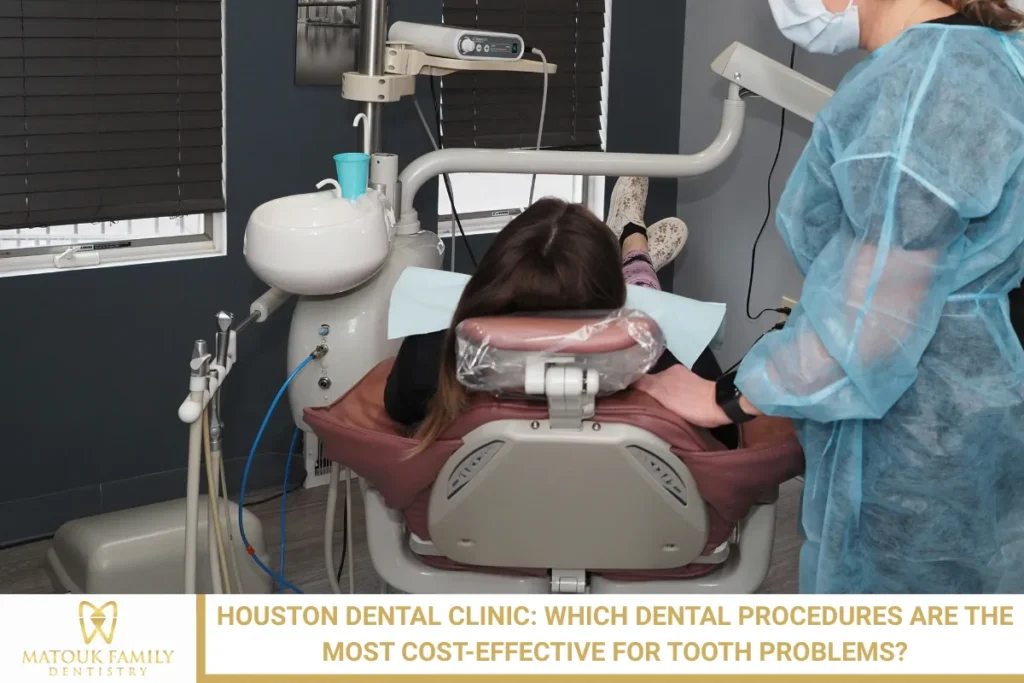A Guide to Long-Lasting Results From Teeth Whitening in Houston
Teeth whitening in Houston has become one of the most popular cosmetic dental treatments for individuals seeking to enhance the brightness of their smiles. Whether it’s for a job interview, a wedding, or to boost everyday confidence, many Houstonians turn to professional whitening treatments to achieve a fresh, clean look. However, a crucial question often follows treatment: How long will these results last?
The answer depends on several factors, including the type of treatment you choose, your oral hygiene habits, lifestyle, and diet. This guide explores all those details to help you understand how long professional teeth whitening typically lasts, how to maintain the results, and what options are available in Houston for keeping your smile bright.
What Is Professional Teeth Whitening?
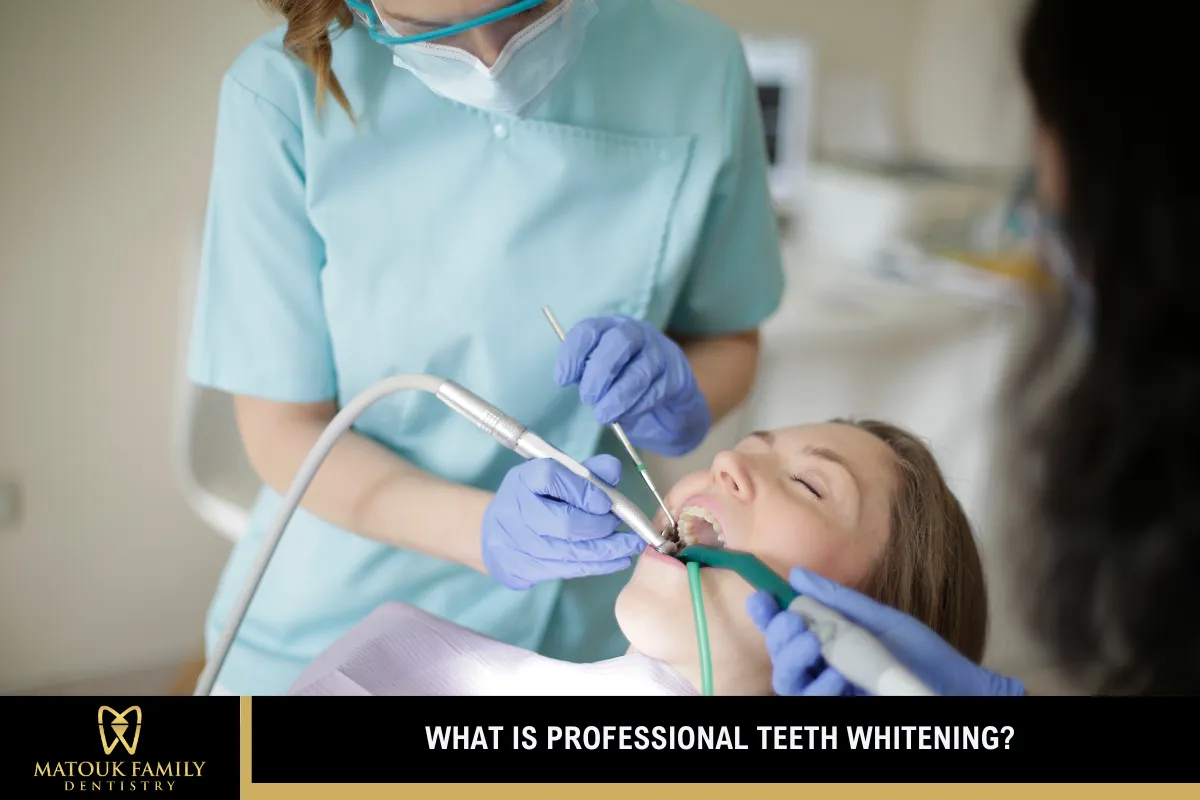
Professional teeth whitening is a dental procedure that uses strong bleaching agents to remove stains and discoloration from the surface of your teeth. Unlike store-bought whitening products, which may take weeks or even months to show noticeable changes, professional whitening offers faster and more dramatic results. Dentists in Houston use carefully controlled techniques that are both effective and safe, often producing a whiter smile after just one visit.
These treatments work by applying a peroxide-based gel to the teeth. Some methods involve using a special light or laser to activate the gel, thereby accelerating the whitening process. The goal is to break down stains into smaller pieces. Hence, the color becomes less concentrated, leaving your teeth looking brighter and cleaner.
Types of Teeth Whitening Treatments Available in Houston
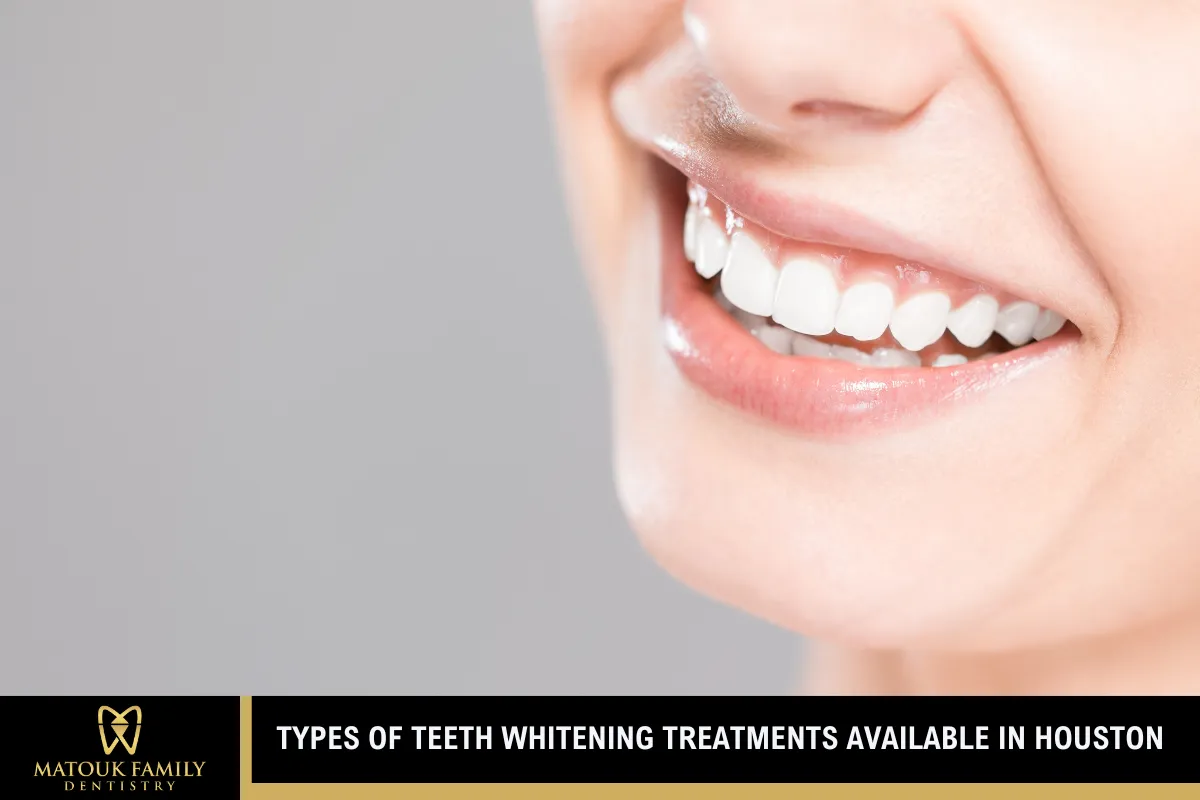
In-Office Whitening
This is the most effective option for those seeking rapid results. It is typically performed in a dental office during a single visit. The process uses high-concentration whitening gel that a dental professional applies. Some systems utilize lights or lasers to amplify the effect of the gel, enabling you to achieve noticeable whitening in under two hours.
In Houston, in-office whitening is commonly offered in general and cosmetic dental practices. It’s a favorite among professionals, brides, and anyone needing quick results for an upcoming event.
Custom Take-Home Whitening Trays
These trays are custom-made to fit your teeth and are provided by a dentist. You’ll receive professional-grade whitening gel to use at home, typically over 1 to 2 weeks. While it takes longer than in-office whitening, the results can still be impressive and more gradual, which some people prefer.
This method is popular for individuals who want to whiten their teeth on their schedule or those with sensitive teeth that respond better to slower whitening processes.
Combination Treatments
Some Houston dental offices recommend combining in-office whitening with take-home trays for long-term maintenance. You get immediate brightening from the office treatment, and the trays help you maintain the results over time.
How Long Does Professional Teeth Whitening Last?
On average, professional teeth whitening can last between 6 months and 3 years, depending on several personal factors. For many people in Houston, the results typically remain noticeable for about 12 to 18 months. However, lifestyle choices can significantly shorten or extend that time.
What affects how long your whitening lasts?
- The type of whitening treatment you choose
- Your daily diet and beverage consumption
- Whether you smoke or use tobacco
- How well you maintain your oral hygiene
- The natural color and condition of your teeth before treatment
Generally, individuals who avoid staining foods and beverages and take good care of their teeth can enjoy their whitening results for a longer period.
What Makes Teeth Whitening Results Fade Faster?
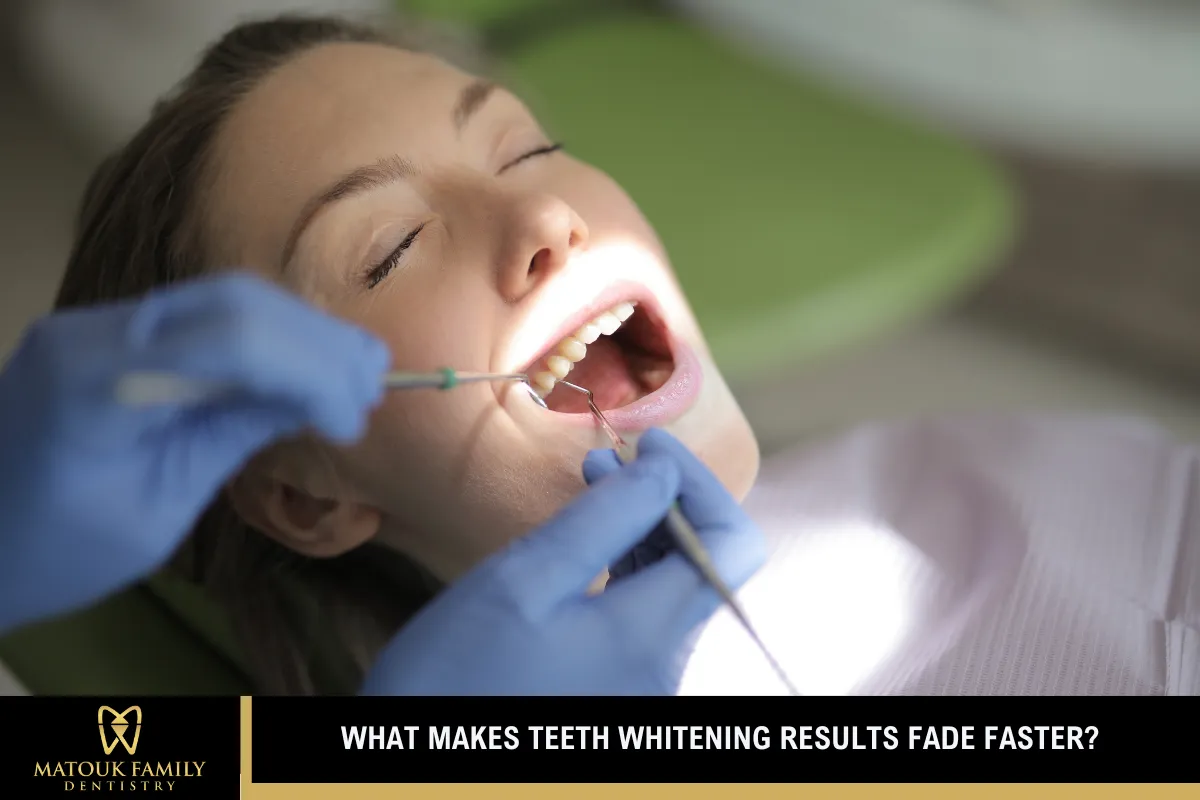
Food and Drink Choices
Many of Houston’s favorite foods and drinks can stain your teeth. Dark-colored liquids, such as coffee, tea, red wine, and cola, are top offenders. Foods like tomato sauce, soy sauce, and deeply pigmented fruits (like berries) also contribute to staining.
Suppose you consume these items regularly without rinsing or brushing afterward. In that case, your teeth may begin to discolor more quickly after the whitening treatment.
Smoking and Tobacco Use
Tobacco is one of the biggest causes of tooth discoloration. Nicotine and tar leave yellow or brown stains that penetrate the enamel, causing permanent damage to the teeth. These stains not only make your teeth look darker but also make whitening less effective and the results less durable.
Poor Oral Hygiene
Inconsistent brushing and flossing lead to plaque buildup, which can dull the brightness of your teeth. Without regular cleanings, stains can settle in more quickly, reducing the lifespan of your whitening treatment.
How to Make Your Whitening Last Longer in Houston
Keeping your smile bright doesn’t end when you leave the dentist’s office. Here’s how you can make the most of your investment:
Use a Straw for Beverages
Drinking coffee, tea, or soda through a straw helps reduce the contact between the liquid and your teeth, which can help preserve your whitening results.
Rinse After Eating or Drinking
When you eat foods that might stain your teeth, try rinsing your mouth with water immediately afterward. This quick action can prevent particles from settling on your enamel.
Maintain Regular Dental Checkups
Visiting your dentist every six months for professional cleanings helps prevent plaque buildup and catches early signs of discoloration.
Use Whitening Toothpaste
Choose a dentist-recommended whitening toothpaste that contains low levels of peroxide or stain-removing agents. It won’t replace professional whitening, but can help maintain your results.
Touch-Up Treatments
Many dentists in Houston offer affordable touch-up kits or in-office follow-ups. Getting a minor touch-up every 6 to 12 months can help you maintain a consistently bright smile without having to start from scratch.
Teeth Whitening vs. Store-Bought Whitening Products
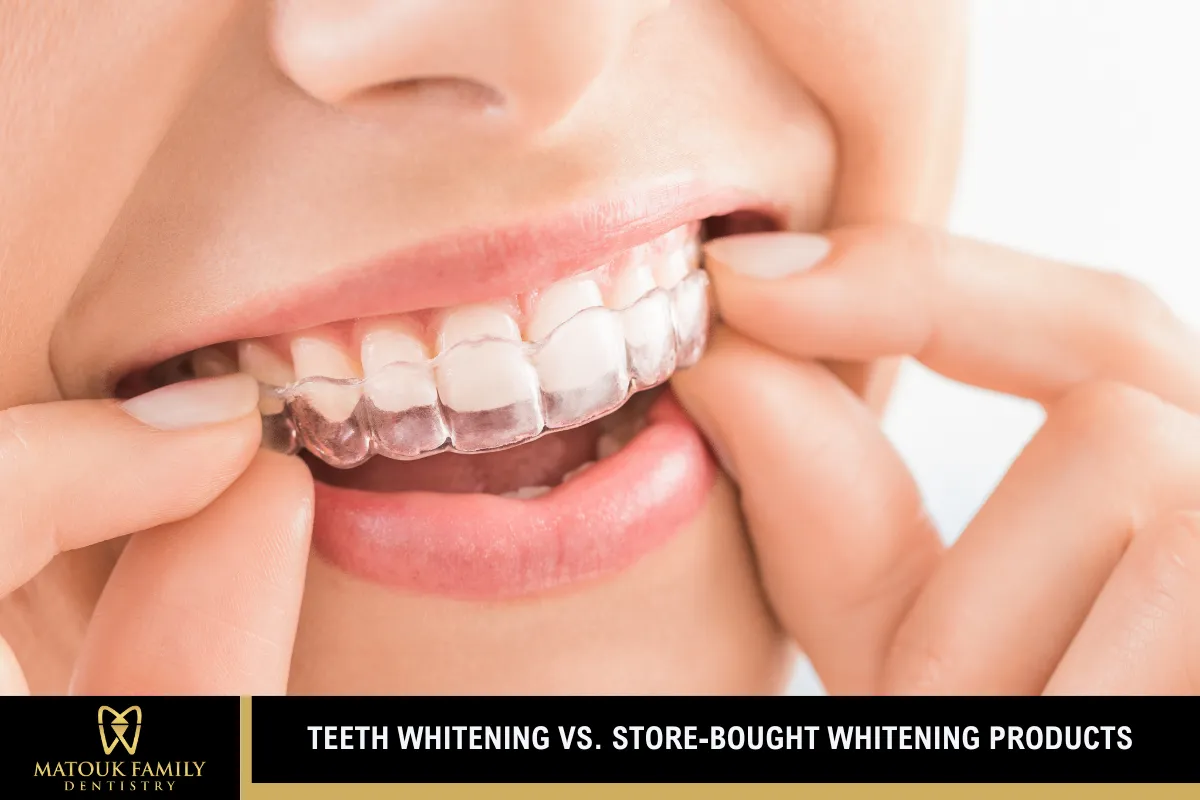
It’s easy to walk into any store in Houston and find shelves stocked with whitening strips, pens, and LED kits. These products might seem convenient, but they don’t compare to professional options.
Store-bought kits usually contain lower concentrations of bleaching agents. This means it takes much longer to see any results. They also come in one-size-fits-all trays or strips that may not fit your teeth properly, leading to uneven whitening or gum irritation.
Professional whitening is tailored to your specific needs. Your dentist selects the right concentration, applies it safely, and monitors the process to minimize discomfort.
Who Should Avoid Whitening?
Although professional teeth whitening is safe for most people, there are a few exceptions. Dentists in Houston recommend avoiding whitening if:
- You’re under 16 years old (your teeth and gums are still developing)
- You have untreated cavities or gum disease
- You’re allergic to peroxide-based products
- You have dental restorations like crowns or veneers that won’t respond to whitening
- You experience chronic tooth sensitivity
Always schedule a dental consultation to determine if you’re a good candidate for whitening treatments.
What About Sensitivity After Whitening?
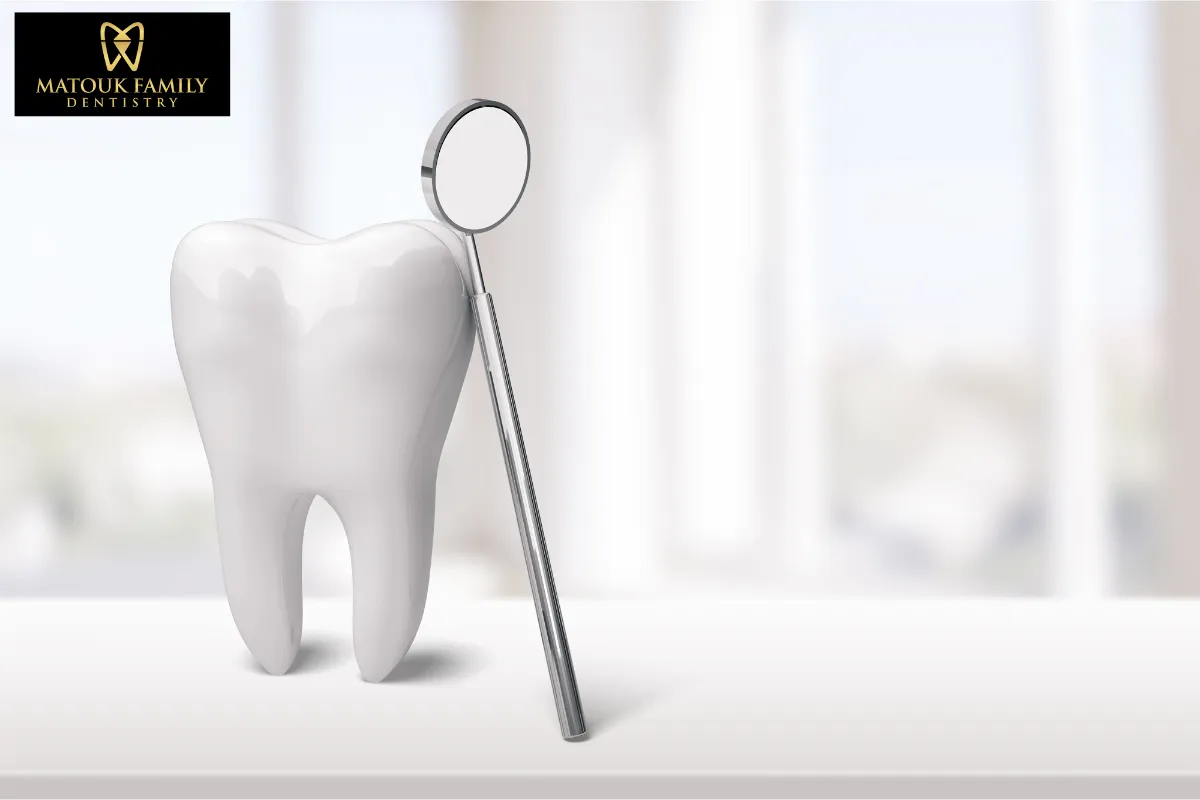
Some people experience tooth sensitivity after whitening, especially with higher-strength products. This usually goes away within a few days. Using desensitizing toothpaste before and after treatment can help reduce discomfort. Dentists in Houston can also adjust the strength of the whitening gel if sensitivity is a concern.
How Do You Know It’s Time for a Touch-Up?
You might start to notice that your teeth are losing their brightness. This can happen gradually over several months. You’ll know it’s time for a touch-up when:
- You notice visible yellowing or dullness
- You start drinking more staining beverages again
- You have a big event coming up and want a brighter smile
A quick consultation with your Houston dentist can help decide if a full whitening or a minor refresh is best.
Alternatives to Whitening
Not everyone achieves the desired results from whitening treatments. In some cases, other cosmetic solutions may be better suited:
- Porcelain veneers can cover deep stains that don’t respond to whitening
- Dental bonding helps correct uneven color or surface flaws
- Internal bleaching treats discoloration in teeth that have had root canals
Dentists in Houston offer these services as part of a comprehensive approach to cosmetic dentistry.
Final Thoughts on Whitening Durability
Whitening your teeth professionally in Houston can yield remarkable results that enhance your confidence and enhance your overall appearance. But like most cosmetic treatments, the results aren’t permanent. With the right care, you can extend the lifespan of your whitening and keep that radiant smile glowing for months, sometimes even years.
By understanding what affects your results and adopting smart habits, you can maximize the value of your treatment. Whether you choose in-office whitening, take-home trays, or a combination of both, the journey to a brighter smile doesn’t end when you leave the dental chair.
Houston Teeth Whitening – Matouk Family Dentistry
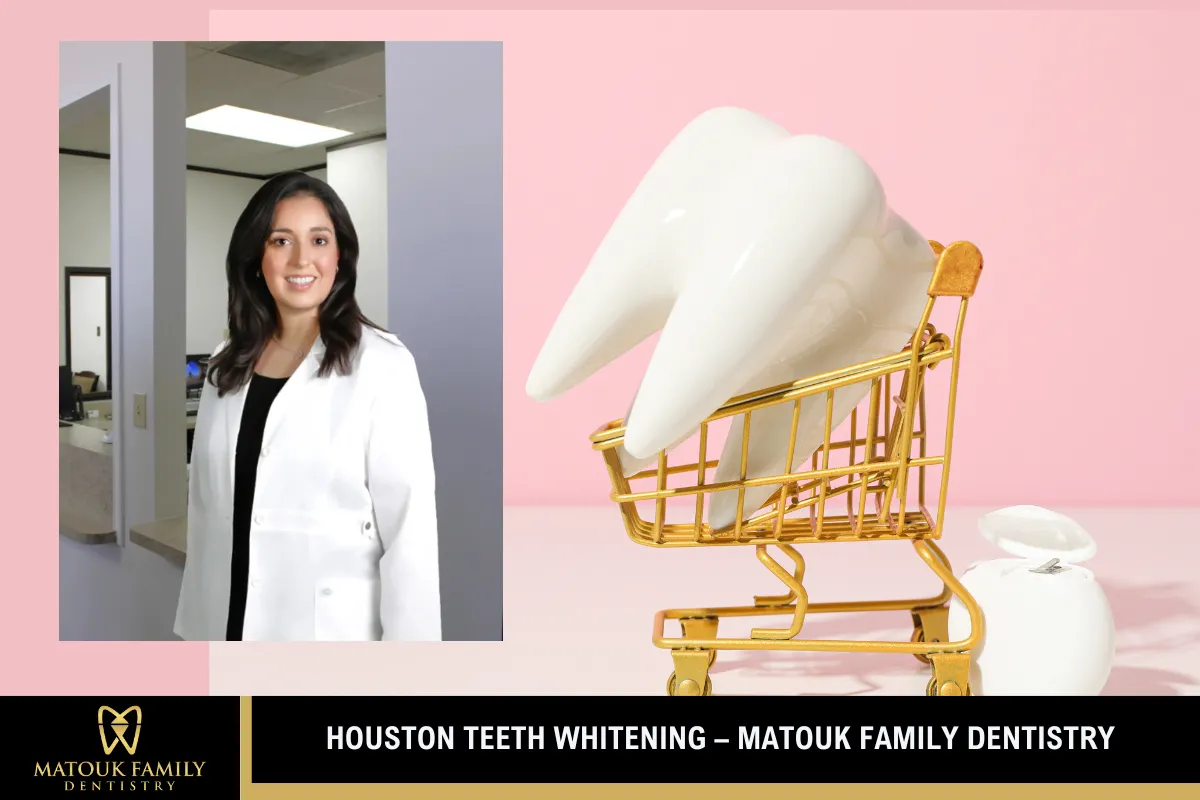
Ready to get a whiter, brighter smile that lasts? Matouk Family Dentistry offers professional teeth whitening in Houston that delivers noticeable results quickly and safely. Our treatments are designed to remove years of stains and restore the natural glow of your smile.
Located just off the Gulf Freeway, our clinic provides a comfortable and caring environment where every patient is treated like family. Led by Dr. Christina Matouk, our team takes pride in delivering high-quality care tailored to your specific needs. Whether you’re interested in whitening or need other dental services, we’re here to help you feel confident about your smile again.
Contact us at (281) 484-3675 to schedule your whitening consultation today!
Frequently Asked Questions About Teeth Whitening in Houston
1. Is tooth sensitivity after teeth whitening permanent?
Tooth sensitivity, especially following a whitening procedure, is usually temporary. It occurs when the active ingredients—often hydrogen peroxide or carbamide peroxide—penetrate the tooth enamel and reach the dentin layer, causing short-term dentin hypersensitivity. This discomfort typically fades within 24 to 72 hours after treatment.
If sensitivity persists, cosmetic dentists in Houston may recommend using a whitening toothpaste formulated for sensitive teeth, which contains potassium nitrate or stannous fluoride. These ingredients help block nerve signals and strengthen the enamel.
To minimize sensitivity:
- Avoid hot or cold beverages immediately after the whitening treatment
- Use a soft-bristled toothbrush
- Try at-home whitening products with lower concentrations of bleaching agents
Consult a dental professional before beginning any whitening procedure, especially if you have a history of sensitive teeth or exposed root surfaces. They can help you find the safest whitening options based on your oral health condition.
2. What are the safest whitening products to use at home?
Safe at-home whitening products include whitening strips, custom trays from your dentist, and whitening toothpaste. Look for products approved by the American Dental Association (ADA) and containing regulated levels of teeth bleaching agents, such as hydrogen peroxide.
Safe and effective whitening at home includes:
- ADA-approved whitening strips used as directed
- Whitening toothpaste with mild abrasives to remove surface stains
- Custom-fitted trays from your dental professional for more controlled bleaching
Be cautious of over-the-counter kits that contain high levels of peroxide or questionable active ingredients. Misuse can damage your tooth enamel, increase dentin hypersensitivity, or irritate your gums.
For Houston residents, it’s best to discuss at-home options with a local cosmetic dentist. They can evaluate your oral health and recommend safe products tailored to your needs. Avoid using any whitening method more frequently than advised, as excessive bleaching may lead to long-term enamel erosion and tooth sensitivity.
3. Can teeth whitening remove intrinsic stains?
Intrinsic stains are discolorations that occur beneath the surface of the enamel, often caused by medication, trauma, aging, or excessive fluoride. These stains are more challenging to treat than surface stains and typically don’t respond well to standard whitening products or over-the-counter methods.
While some professional treatments using high-concentration teeth bleaching agents may slightly lighten intrinsic stains, complete removal is unlikely. For this reason, many cosmetic dentists in Houston recommend alternative whitening options for deep stains.
Best solutions include:
- Dental veneers to cover stained teeth with thin, porcelain shells
- Bonding procedures that apply tooth-colored resin to mask the discoloration
- Internal bleaching, a special whitening procedure used after root canals
If you’re unsure what type of stain you have, schedule a consultation with a dental professional. They can assess the severity and origin of the discoloration and suggest the most effective cosmetic procedure for a whiter smile.
4. How much does professional teeth whitening cost in Houston?
Teeth whitening costs in Houston can vary depending on the method used, the provider’s expertise, and the condition of your teeth. On average, in-office whitening treatments cost between $300 and $800 per session. These professional treatments often use high-strength teeth bleaching agents, such as hydrogen peroxide. They are performed under the supervision of a cosmetic dentist.
Here’s a general pricing breakdown:
- In-office whitening: $300–$800
- Custom take-home trays: $200–$400
- Over-the-counter whitening strips: $20–$60
While over-the-counter whitening products seem cheaper, they often require repeat use and deliver slower, less consistent results. In contrast, professional treatments offer quicker and longer-lasting results with minimized risk of damaging your tooth enamel.
Suppose you have dental restorations or are prone to tooth sensitivity. In that case, it’s even more important to consult a qualified dental professional before choosing any whitening method. Some dental clinics also offer flexible payment plans or discounts for bundled services, such as teeth cleaning followed by whitening.
5. Will whitening products work on crowns, veneers, or dental restorations?
No, most whitening products—whether over-the-counter or professional—do not alter the color of dental restorations, such as crowns, veneers, or tooth-colored fillings. These materials are made from porcelain or composite resin, which do not respond to teeth bleaching agents the same way natural teeth do.
That means if you whiten your natural teeth, any existing restorations will remain the same shade, potentially creating a color mismatch.
To manage this:
- Discuss your treatment plan with a cosmetic dentist
- Consider replacing older restorations after whitening to match the new shade
- Avoid DIY whitening kits if you have multiple restorations
In Houston, cosmetic dentists often recommend whitening natural teeth before placing veneers or crowns to ensure a uniform and aesthetically pleasing result. Always consult a dental professional to plan the best approach for achieving a consistent whiter smile while preserving your restorative work.
Read more: How South Houston Dental Clinics Cater to Different Age Groups

